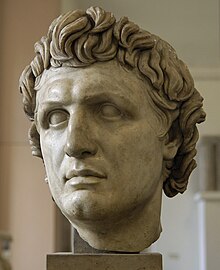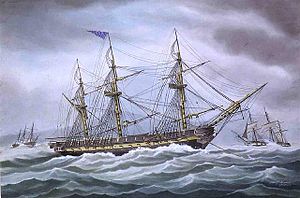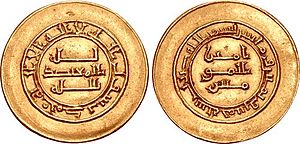Portal:History
The History Portal

History by Frederick Dielman
History (derived from Ancient Greek ἱστορία (historía) 'inquiry; knowledge acquired by investigation') is the systematic study and documentation of the human past. History is an academic discipline which uses a narrative to describe, examine, question, and analyze past events, and investigate their patterns of cause and effect. Historians debate which narrative best explains an event, as well as the significance of different causes and effects. Historians debate the nature of history as an end in itself, and its usefulness in giving perspective on the problems of the present.
The period of events before the invention of writing systems is considered prehistory. "History" is an umbrella term comprising past events as well as the memory, discovery, collection, organization, presentation, and interpretation of these events. Historians seek knowledge of the past using historical sources such as written documents, oral accounts or traditional oral histories, art and material artifacts, and ecological markers.
Stories common to a particular culture, but not supported by external sources (such as the tales surrounding King Arthur), are usually classified as cultural heritage or legends. History differs from myth in that it is supported by verifiable evidence. However, ancient cultural influences have helped create variant interpretations of the nature of history, which have evolved over the centuries and continue to change today. The modern study of history is wide-ranging, and includes the study of specific regions and certain topical or thematic elements of historical investigation. History is taught as a part of primary and secondary education, and the academic study of history is a major discipline in universities.
Herodotus, a 5th-century BCE Greek historian, is often considered the "father of history", as one of the first historians in the Western tradition, though he has been criticized as the "father of lies". Along with his contemporary Thucydides, he helped form the foundations for the modern study of past events and societies. Their works continue to be read today, and the gap between the culture-focused Herodotus and the military-focused Thucydides remains a point of contention or approach in modern historical writing. In East Asia a state chronicle, the Spring and Autumn Annals, was reputed to date from as early as 722 BCE, though only 2nd-century BCE texts have survived. The title "father of history" has also been attributed, in their respective societies, to Sima Qian, Ibn Khaldun, and Kenneth Dike. (Full article...)
Featured picture
Did you know (auto generated)

- ... that a massive smallpox epidemic struck the Pacific Northwest shortly before historical records were kept?
- ... that the Creamoata Mill, which once produced a now-nonexistent breakfast food, was listed as Gore's only "place of outstanding historical and cultural influence"?
- ... that interviews collected for a Boston College oral history project were used in two murder trials?
- ... that a historian lamented the lack of English-language translations for the work of Aracy Amaral despite it being "a vital reference for the study of art history in Brazil"?
- ... that the Pulitzer jury said that Ford Strikers Riot is "a brutal picture, it sums up much of the labor history of 1941"?
- ... that at the age of 28, Mason Morelli became the first player in Vegas Golden Knights franchise history to record two points in their National Hockey League debut game?
Óengus son of Fergus (Pictish: *Onuist map Vurguist; Old Irish: Óengus mac Fergusso, lit. 'Angus son of Fergus'; died 761) was king of the Picts from 732 until his death in 761. His reign can be reconstructed in some detail from a variety of sources. The unprecedented territorial gains he made from coast to coast, and the legacy he left, mean Óengus can be considered the first king of what would become Scotland.
Wresting power from his rivals, Óengus became the chief king in Pictland following a period of civil war in the late 720s. (Full article...)
On this day
- 1796 – French Revolutionary Wars: French forces won the Battle of Arcole in a manoeuvre to cut the Austrians' line of retreat.
- 1894 – H. H. Holmes (pictured), one of the first modern serial killers, was arrested in Boston after killing at least nine people.
- 1968 – NBC controversially cut away from an American football game between the Oakland Raiders and New York Jets to broadcast Heidi, causing viewers in the Eastern United States to miss the game's dramatic ending.
- 1989 – Walt Disney Pictures released The Little Mermaid to theatres, beginning the Disney Renaissance.
- 2009 – Administrators at the University of East Anglia's Climatic Research Unit discovered that their servers had been hacked, and thousands of emails and files on climate change had been stolen.
- Nikephoros Melissenos (d. 1104)
- Agnes of Jesus (b. 1602)
- Maria Antonia Ferdinanda of Spain (b. 1729)
- Nicolas Appert (b. 1749)
Selected quote
Truth alone will endure, all the rest will be swept away before the tide of time. I must continue to bear testimony to truth even if I am forsaken by all. Mine may today be a voice in the wilderness, but it will be heard when all other voices are silenced, if it is the voice of Truth.
— Gandhi, Indian political and spiritual leader
Related portals
More Did you know...
- ... that on 26 April 1881 HMS Doterel (pictured) exploded, killing 143 of the 155 crew members?
- ... that causes of the deaths at the Berlin Wall included shooting, drowning, suffocation, suicide, and falling from a balloon?
- ... that the 19th-century swindler Bertha Heyman, known as "The Confidence Queen," conned men by pretending to be a wealthy woman who was unable to access her fortune?
- ... that only four great uncial codices have survived until the present day?
- ... that after World War II, Polish resistance organizer and Warsaw Uprising fighter Jan Mazurkiewicz was brutally tortured by the authorities in communist Poland?
- ... that tiny Paederus beetles may have caused some of the ten Plagues of Egypt?
- ... that the only known report of bloodshed during the simulated Nazi invasion of Winnipeg was from a woman who cut her thumb while preparing toast?
- ... that Dacian bracelets were used as currency and votive offerings?
Topics
Categories

History • By period • By region • By topic • By ethnic group • Historiography • Archaeology • Books • Maps • Images • Magazines • Organizations • Fictional • Museums • Pseudohistory • Stubs • Timelines • Chronology • People • Wikipedia historians
WikiProjects
![]() WikiProject History •
Ancient Near East • Australian History • Classical Greece and Rome • Dacia • Former countries • History of Canada • Chinese history • European history • Heraldry and vexillology • Indian history • Jewish history • Medieval Scotland • Mesoamerica • Military history • Middle Ages • History of Science
WikiProject History •
Ancient Near East • Australian History • Classical Greece and Rome • Dacia • Former countries • History of Canada • Chinese history • European history • Heraldry and vexillology • Indian history • Jewish history • Medieval Scotland • Mesoamerica • Military history • Middle Ages • History of Science
WikiProject Time • Days of the Year • Years
WikiProject Biography • Composers • Political figures • Saints • United States Presidents
Things you can do
 |
Here are some tasks awaiting attention:
|
Associated Wikimedia
The following Wikimedia Foundation sister projects provide more on this subject:
-
Commons
Free media repository -
Wikibooks
Free textbooks and manuals -
Wikidata
Free knowledge base -
Wikinews
Free-content news -
Wikiquote
Collection of quotations -
Wikisource
Free-content library -
Wikiversity
Free learning tools -
Wiktionary
Dictionary and thesaurus
























































